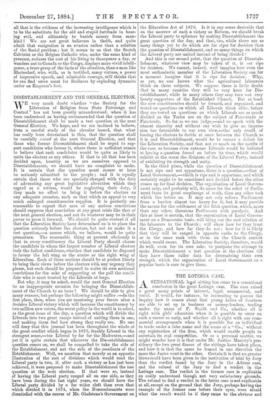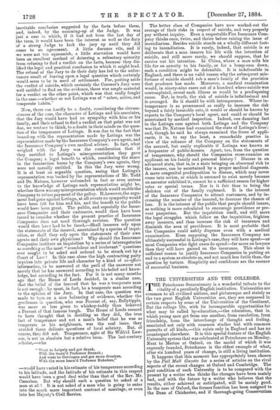THE LOTINGA CASE.
ASENSATIONAL legal sitting has come to a sensational conclusion in the great Lotinga case. The case raised a great many points of interest, legal, commercial, and social. It would, for instance, be interesting to pursue the inquiry how it comes about that young ladies of fourteen are able to set up in business as money-lenders, trading under the name of F. Smith and Co., whether all is right with girls' education when it is possible to enter on such a career so early, and whether all is right with our com- mercial arrangements when it is possible for an individual to trade under a false name and the name of a " Co.," without any registration of the firm, which would enable people to ascertain its real competition. Or as a personal matter, we might wonder how it is that under Mr. Justice Manisty's pre- sidency the two great fiascos of the sittings have taken place, and how it is that the more he leaned in one direction the more the Juries went in the other. Certain it is that no greater blows could have been given to the institution of trial by Jury than the verdict found by the Jury in the Adams case, and the refusal of the Jury to find a verdict in the Lotinga case. The verdict in the former case is explicable on easily understood though not very satisfactory grounds. The refusal to find a verdict in the latter case is not explicable at all, except on the ground that the Jury, perhaps having the example of the former case before their eyes, were afraid what the result would be if they came to the obvious and inevitable conclusion suggested by the facts before them, and, indeed, by the summing-up of the Judge. It was just a case in which, if it had not been the last day of the term, it would have been, the interest as well as the duty of a strong Judge to lock the jury up until they did come to an agreement. A little durance vile, and if we were not too squeamish, a little starvation would have been an excellent method of deterring a refractory minority from refusing to find a verdict on the facts, because they dis- liked the legal and practical conclusion to which it might lead. The refusal of the Jury to do their duty has led to the unfor- tunate result of leaving open a legal question which certainly would seem to be in need of settlement. For, putting aside the verdict of suicide, which certainly the Coroner's Jury were well entitled to find on the evidence, there was ample material for a verdict on the other point, which was that really fought in the case—whether or not Lotinga was of " sober, active, and temperate habits."
Now, there can hardly be a doubt, considering the circum- stances of the case, the character of Lotinga and his associates, that the Jury would have had no sympathy with him or his family, and their refusal to find a verdict on that point was not due, we venture to think, to a doubt in their minds on the ques- tion of the temperance of Lotinga. It was due to the fact that bound-up with the representation made by Lotinga was the representation made by the Insurance Company's own agent, and the Insurance Company's own medical adviser. In fact, what weighed with the Jury was the consideration that if they certified to Lotinga's misrepresentation they gave the Company a legal benefit to which, considering the share in the transaction borne by the Company's own agents, they were not morally entitled. In this the Jury were wrong. It is at least an arguable question, seeing that Lotinga's representation was backed by the representations of Mr. Todd and Dr. Natrass, however unfounded in fact or even untrue to the knowledge of Lotinga such representation might be, whether there was anymisrepresentation which would enable the Company to refuse payment of the policy. If, however, the argu- ment had gone against Lotinga, at all events no sympathy would have been felt for him and his, and the benefit to the public would have been great. The public, and especially the Insur- ance Companies and their customers, would then have been forced to consider whether the present practice of Insurance Companies does not need thorough revision. The question would then have had to be faced,—Shall insurers rely upon the statements of the insured, ascertained by a species of inqui- sition, or shall they rely upon the statements of their own agents and their own physicians ? Why should the Insurance Companies institute an inquisition by a series of interrogatories as searching as the most " scandalous and irrelevant " questions ever sought to be asked and ordered to be struck out by a Court of Law ? In this case alone the high contracting party inquires into private life and character by a kind of ex-dicio information, to be answered at the peril of the answerer not merely that he has answered according to his belief and know- ledge, but according to the fact. For it is not many months ago that the House of Lords decided, in a similar case, that the belief of the insured that he was a temperate man is not enough ; he must, in fact, be a temperate man according to the opinion of the Jury. In that case, the question was made to turn on a nice balancing of evidence, whether the gentleman in question, who was Provost of, say, Ballytipple, was more or less given to whiskey-toddy than behoved a Provost of that famous burgh. The House of Lords seemed to have thought that in deciding as they did, the true fact of temperance and not a man's belief that he was as temperate as his neighbours, was the real issue, they avoided those delicate questions of local sobriety. But, of course, they did not. Temperance, spite of Sir Wilfrid Law- son, is not an absolute but a relative term. The last-century scholar,—who "Went to Leipsig and got drunk,
With the learn'd Professor Braila; And went to Gottingen and got more drunken, With the more learn'd Professor Ittihnken,"
—would have varied in his estimate of his temperance according to his latitude, and the latitude of his estimate in this respect would have been a good deal wider than that of the Rev. Mr. Casaubon. But why should such a question be asked of a man at all ? It is not asked of a man who is going to enter into the much more important contract of marriage, or even into her Majesty's Civil Service. The better class of Companies have now worked-out the average of their risks in respect of suicide, and very properly pay without inquiry. Even a respectable Fire Insurance Com- pany thinks once, twice, and thrice before raising the issue of incendiarism. Besides suicide stands on a wholly different foot- ing to incendiarism. It is rarely, indeed, that suicide is so deliberate that a man insures his life with the intention of suicide, and still more rarely, we should suppose, that he carries out his intention. In China, where a man sells his life for an annuity to his family, or for a lump-sum down, such a condition might be defensible. It is indefensible in England, and there is no valid reason why the subsequent mis- fortune of suicide should rob a man's family of the provision that prudence has made. Moreover, a medical examination would, in ninety-nine cases out of a hundred where suicide was contemplated, reveal such illness as would be a predisposing cause. But, in truth, the risk of suicide is infinitesimal and is averaged. So it should be with intemperance. Where in- temperance is so pronounced as really to increase the risk beyond a fairly insurable rate, it would or should be known by reports to the Company's local agent, and could or should be ascertained by medical inspection. Indeed, one damning fact in the Lotinga case against both Lotinga and the Company was that Dr. Natrass had examined the state of Lotinga's liver; and, though he said he always examined the livers of appli- cants, it is, to say the least, a remarkable practice in view of the reliance of the Company on the statements of the assured, but easily explicable if Lotinga was known as a frequenter of public-houses. Apart, too, from the question of temperance, why should the Companies cross-examine an applicant on his family and personal history ? Disease in an advanced state, that is, in a state bringing on abnormal risk to the insurer, can be ascertained by a proper medical diagnosis.
A mere congenital predisposition to disease, which may never come into action, or which is assumed to exist merely because an ancestor exhibited it, cannot be a sufficient reason for higher rates or special terms. Nor is it fair thus to bring the skeleton out of the family cupboard. It is the interest of the Insurance Companies to attract customers, and by in- creasing the number of the insured, to decrease the chance of loss. It is the interest of the public that people should insure, as nothing is more calculated to encourage providence or pre- vent pauperism. But the inquisition itself, and still more the legal struggles which follow on the inquisition, frighten away insurers, and thus increase the risk of insurance and diminish the area of providence. It is most probable that the Companies could safely dispense even with a medical examination. Even supposing the Insurance Company are ultimately successful in Lotinga's case, they will have spent—as most Companies who fight cases do spend—far more on lawyers than they will have gained on the insurance. This alone is sufficient reason to justify Insurance Companies in putting an end to a system as obsolete as, and not much less futile than, the question by torture. Simplicity and confidence are the essence of successful business.



































 Previous page
Previous page